Is It Safe To Share Flour With Your Dog?
02.09.2023.
Flour is a common ingredient found in many homes for baking and cooking. As a dog owner, you may have wondered if it's safe to give your dog flour or foods containing flour. The short answer is yes; dogs can eat small amounts of flour as an occasional treat.
However, flour does not provide much nutritional value for dogs, and large amounts can cause digestive upset. This article will explore whether and how dogs can eat flour safely.
Is Flour Safe for Dogs?
Flour by itself is not toxic to dogs. Plain white flour contains carbohydrates, some traces of minerals, and a few vitamins. So, small quantities will not likely cause harm. However, dogs' bodies are not designed to properly digest grains like flour.
Since flour is highly processed, it has little nutritional value for dogs. Flour may also contain questionable additives like calcium propionate to extend shelf-life.
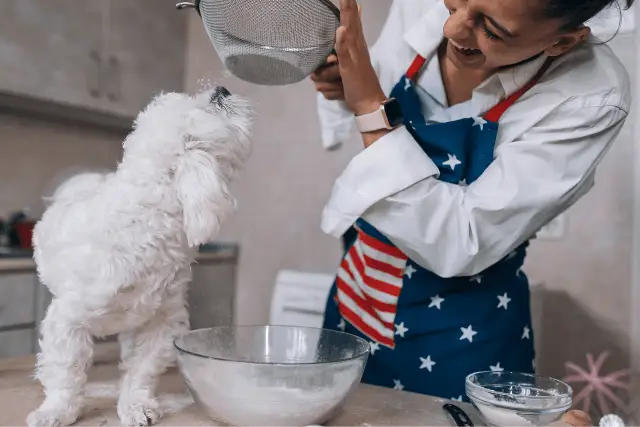
Potential Benefits
The main potential benefit of flour for dogs is as an occasional treat. The flour taste is fairly bland, but some dogs seem to find it palatable. A small piece of baked flour product like a cracker or tortilla can provide mental stimulation and enjoyment.
Just avoid flour products with unhealthy additions like salt, butter, spices, etc. Plain flour should make up no more than 10% of your dog's daily calories.
Risks of Too Much Flour
While the odd lick of flour in a bowl is fine, ingesting large amounts can cause issues for dogs. Here are some of the risks:
- Nutritional deficiencies - Since flour itself contains minimal nutrients, relying on it as a major food source could lead to vitamin/mineral deficiencies long-term. Dogs need a balanced diet with adequate protein, healthy fats, veggies, etc.
- Digestive problems - Dogs lack the enzymes to break down larger amounts of starchy grains and carbs. Too much flour could cause an upset stomach, gas, diarrhea, or constipation.
- Dental damage - Dry flour could stick to a dog's teeth, leading to excess plaque and dental disease. Make sure your dog's teeth get cleaned after eating flour.
- Food allergies - Some dogs are allergic to wheat. Reactions could include itchy skin, ear infections, and gastrointestinal issues. Avoid flour with dogs who have grain allergies.
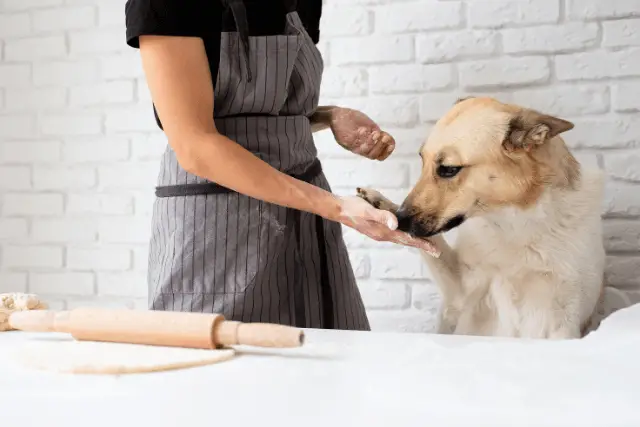
Safe Ways for Dogs to Eat Small Amounts of Flour
If you want to share a flour-based treat with your dog occasionally, here are some safer options:
- Plain Cheerios or similar plain whole grain cereal with just 1-2 tbsp flour.
- A small piece of baked flour item like a plain tortilla or cracker is broken into bites. Avoid buttery crackers.
- Well-cooked oatmeal or whole wheat pancake with just a tsp of flour added.
- Plain dinner roll torn into small pieces. Avoid seasoned/buttery rolls.
- Homemade dog biscuit recipe with 1/4 cup or less of whole wheat flour and no unhealthy additions.
Always supervise your dog with new foods and discontinue if you see signs of an upset stomach or allergic reaction. Introduce new foods gradually and in very small amounts. Also, provide plenty of fresh water to help digestion.
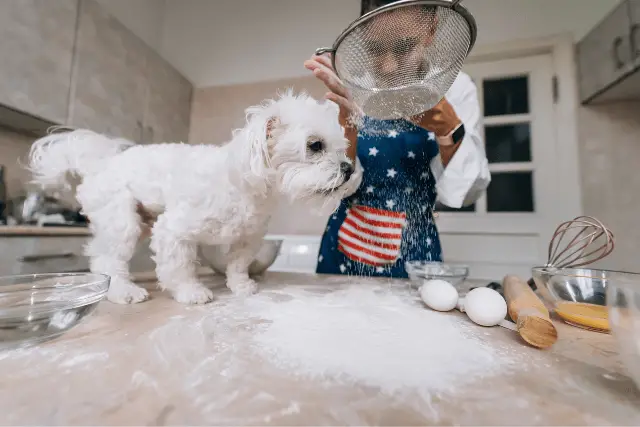
What Foods Contain Flour?
There are many common human foods made with flour that can be dangerous for dogs. Here are some to avoid giving dogs:
- Bread dough - Raw dough expands in the stomach and can cause painful bloating. Only give dogs baked, cooked items.
- Seasoned mixes - Items like biscuit mixes, pancake mix, cake mix, etc., often contain onion powder, garlic powder, or other seasonings that are toxic to dogs.
- Salty snacks - Flour-based snacks like tortilla chips, pretzels, crackers, etc., are typically too high in salt for dogs. Excess salt is unhealthy.
- Sugary baked goods - Cookies, muffins, donuts, etc., are unhealthy due to high sugar content. The fats used may also cause pancreatitis in dogs.
So be very cautious about sharing any flour-containing "people food" with dogs without first understanding the ingredients and risks. When in doubt, stick to dog treats and foods formulated specifically for canine health.
Tips for Dog Owners
If you decide to occasionally allow your dog to lick small amounts of flour or eat flour-based treats, keep these tips in mind:
- Check for allergies - Discontinue flour if you notice any signs of rash, digestive upset, or other allergic reactions.
- Use minimally processed white or whole wheat flour - Avoid flavored, bleached, Instant flours with additives.
- Look for pet-friendly recipes - Follow treat recipes meant for dogs with minimal ingredients and no added salt/sugar.
- Limit flour to <10% of diet - Flour should only be an occasional small snack, not a dietary staple.
- Prevent inhalation - Avoid letting dogs get into bags of powdered flour, which could be inhaled into the lungs.
- Clean teeth after - Brush or rinse your dog's teeth to prevent flour from sticking to teeth and causing decay.
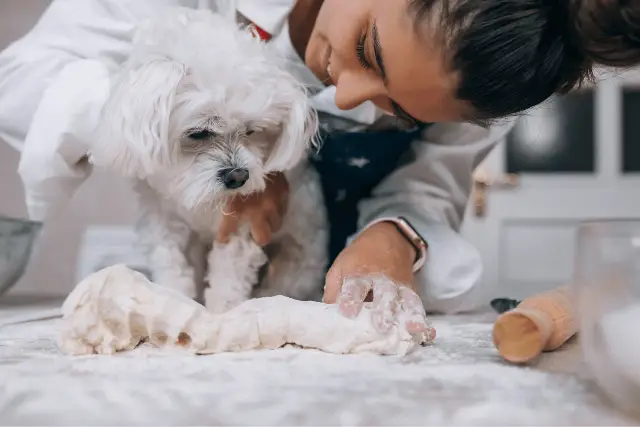
The bottom line is that flour should only be given occasionally and in small amounts. Make sure your dog's main diet includes quality protein, fats, veggies, and balanced nutrition.
Check with your vet if you have any concerns about introducing new foods. With some precautions, the odd bite of flour-based treat is fine for most dogs to enjoy!
Conclusion
While flour won't provide much nutritional value for your dog, small amounts of plain flour are generally safe as an occasional treat. Avoid feeding your dog raw dough or flour-containing foods with unhealthy additives and seasonings.
To keep your dog healthy, make sure flour makes up no more than 10% of their diet and monitor closely for any digestive issues or allergic reactions. With care and monitoring, occasionally sharing flour-based treats can provide dogs with mental stimulation and enjoyment.
Just be sure to check with your vet, especially if your dog has food allergies.
World Dog Finder team

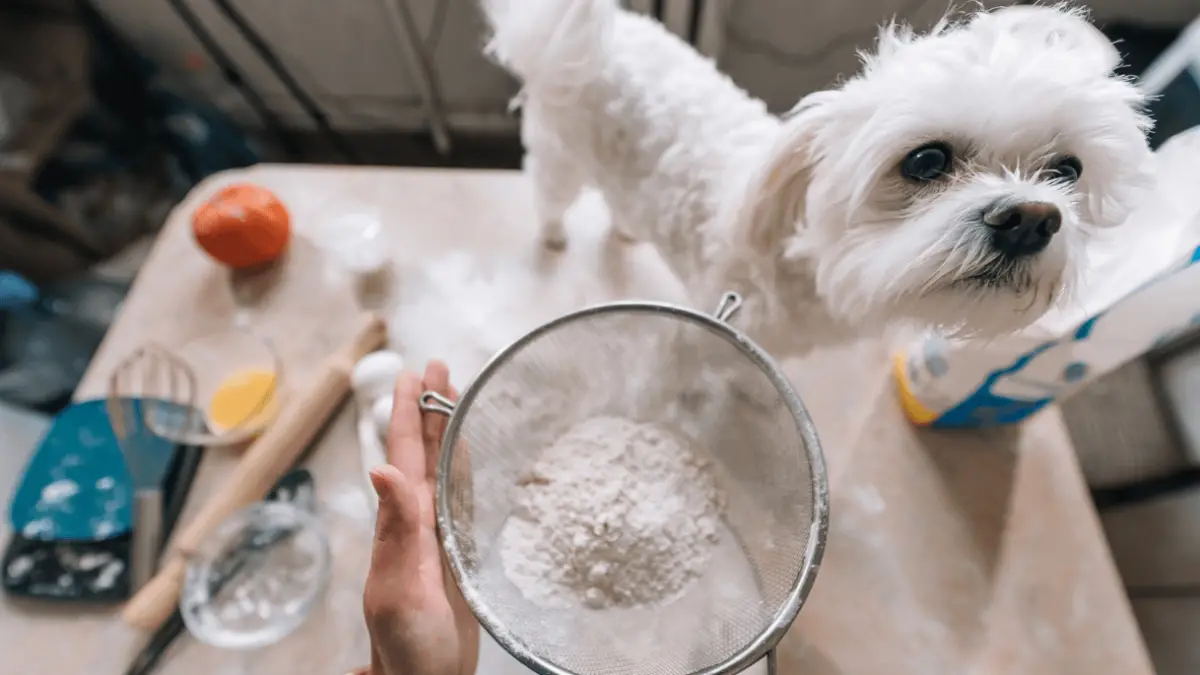
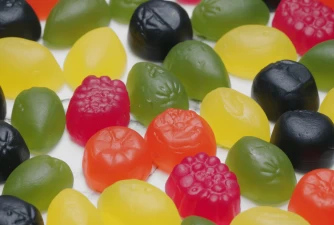
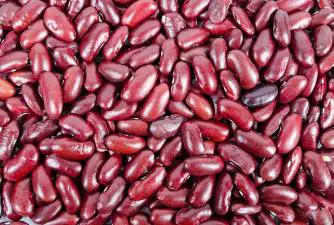
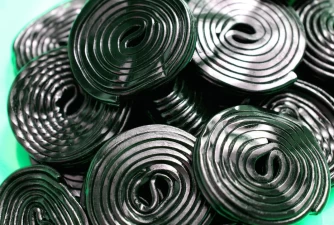


Share